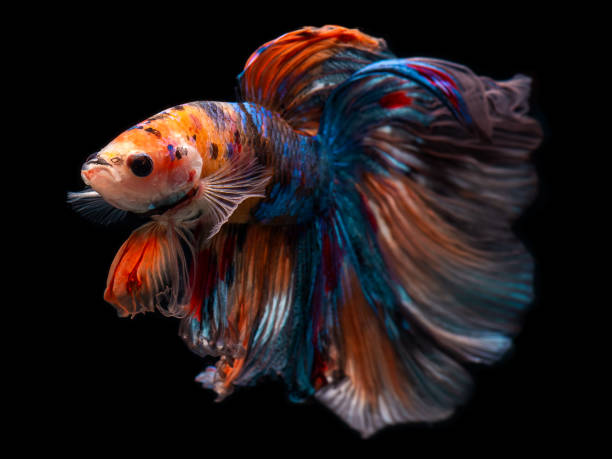Do Betta Fish Need Heater: Reason and Benefits
The betta fish, also known as the Siamese fighting fish or the Betta splendens, is a small tropical freshwater fish belonging to the Betta family. It originates from Thailand and can be found in ponds and rice paddies. They are popular in home aquariums and are considered peaceful pets.
Heaters are not necessary but can make the water temperature more comfortable and warmer for your betta fish. While bettas do not require a heater, some people choose to add one for their convenience. In addition, bettas are very sensitive to temperature changes and a heater can prevent your betta from being stressed.

Table of Contents
Why Do Betta Fish Need Heater?
A betta fish needs a heater to maintain the correct water temperature for its health. They are cold-blooded fish, which means their body temperature is directly related to the water temperature. If the tank water temperature falls below the ideal temperature for them, your Betta will become stressed and may even die. That’s why it’s important to get a heater for your betta if your environment’s temperature is not stable.
Warmer temperatures make the fish more comfortable and help to prevent stress. Heaters increase the water temperature to the ideal degree so your betta will be happy too!
What Is the Ideal Temperature for Bettas?
The ideal water temperature for bettas is 75 to 80 degrees Fahrenheit (23 to 26 degrees Celsius). Bettas do not tolerate temperatures below this range and will become stressed if their tank temperature drops below 70 degrees Fahrenheit (21 degrees Celsius). It is also important to keep the water temperature stable. To maintain a stable temperature, it’s recommended that you don’t suddenly add or remove any water from the tank. The addition or removal of water from your tank should call for an adjustment in the temperature after checking its current state.
What Will Happen to Your Betta if It’s Too Cold?
If the water temperature in your tank falls below 70 degrees Fahrenheit (21 degrees Celsius), your Betta may become stressed. This can result in several symptoms, including loss of appetite, swimming around aimlessly, hiding away from view, and even death.

What Will Happen to Your Betta if It’s Too Hot?
If the water temperature in your tank rises above 82 degrees Fahrenheit (28 degrees Celsius), your betta may also become stressed. Betta fish are tropical fish and as such, they love warm temperatures. However, if their tank water temperature gets too high, your betta may even die. To prevent this from happening, make sure to keep the tank water at a stable temperature and avoid using any heaters that generate too much heat. If your Betta becomes stressed due to being kept in an overheated tank, you can place it in a cool water bath or transport it to a cooler location.
What Heater Should You Use For Your Betta Fish?
There are a variety of aquarium heaters available on the market, including ceramic heaters, small aquarium heaters, and ceramic heat emitters. The most popular choice for betta fish tank heating is a small aquarium heater. These devices can be used in either a glass or plastic tank and are lightweight enough to be placed on the tank’s surface. Ceramic heaters are also popular for use in betta fish tanks, as they provide even heating and don’t produce any fumes or smells.
To guide you even further, here are some of the most significant things that you should consider when purchasing a heater for your betta fish.
Heater with Thermostat
One of the best ways to avoid accidentally setting your house on fire is to choose a heater that has a thermostat. Thermostats allow you to set the temperature at which your heater will work, so you can avoid getting it too hot or too cold. This is especially important if you have young children in the home who may be tempted to play with the heating unit.
Submersible Heater
If you are looking for the absolute safest option, opt for a fully submersible heater. These heaters use an inner water tank to produce warmth and energy. They are incredibly safe because they cannot be turned on by accident or manipulated by children. Additionally, they tend to be more powerful than other types of heaters, which means that they can get your tank warmer faster.
Glass Heaters
If you are willing to spend a bit more money, glass heaters offer several advantages over other types of heaters. They are lightweight and easy to move around the tank, which makes them perfect for positioning near individual fish or plants. Additionally, they often come with built-in filter fans that will help purify the water in your aquarium.

What Heater Size Is Ideal for Betta Fish?
When it comes to choosing the perfect heater for your betta fish tank, size isn’t necessarily everything. You should consider both the wattage and temperature range that you need to comfortably maintain an appropriate level of warmth in your tank.
Generally speaking, smaller heaters, such as 50-watt units, are ideal for tanks up to 25 gallons in size. Larger tanks may require a unit with a higher wattage, such as a 100-watt heater.
How Long Can a Betta Live Without Heater?
Betta fish can survive for a few days without supplemental heat, but they will likely become stressed and begin to exhibit signs of illness. Without a heater, the water temperature in an aquarium will drop below 70 degrees Fahrenheit (21 degrees Celsius) and the betta will quickly die.
Provided that the tank is adequately heated and maintained, betta fish can usually survive in a cold environment without a heater. But again, they will likely become sluggish and develop multiple health problems if the temperature falls below 70 degrees Fahrenheit (21 degrees Celsius).
What Are Heater Alternatives in Case of Emergency?
If your tank water ever becomes too cold for your betta fish, there are a few things you can do to warm it up quickly.
Hot Water Bottles
One quick and easy way to heat a tank is to fill it with warm water and place the fish at the bottom of the bottle. Be sure to remove any rocks ornaments from the bottom of the tank so that they don’t become trapped in the hot water. This method can be used as long as there are plenty of bottles available, but it may not be ideal if you have a large number of fish.
Heat Pads
Another option is to use a heating pad. To do this, place the pad in the bottom of the tank and adjust it to a temperature that is comfortable for your fish. Be sure not to put it too close to any surfaces that may be heated up by an electric heater, as this could cause burns. This method can be used indefinitely, but it will require some additional attention to keep the tank at a consistent temperature.
Candles
Candles make a great way to heat a tank quickly, and they are also safe for the fish. All you need is some wax paper or foil, an incense stick (optional), and a candle. Place the wax paper in the bottom of your tank so that it covers all of the surfaces except for the top. Light the incense stick and wait until it starts to smoke before placing it on top of the wax paper. This will create a hot vapor that will heat the water in your tank. Be sure to remove the candle once it has cooled down, and be careful not to set the wax paper on fire!
What Are the Advantages of Using a Heater?
While these alternatives can work out just fine, heaters still have specific advantages as to why they are highly recommended.
- Heaters are capable of heating water to the specific temperature that you request, whether it is 78 degrees Fahrenheit (25 degrees Celsius) or 80 degrees Fahrenheit (27 degrees Celsius). This allows you to ensure that your betta fish is comfortable and happy.
- Heaters are very efficient and can heat water quickly and easily, allowing you to get the tank heated up in no time.
- Heaters help to ensure a clean and safe aquarium by providing heat that kills harmful bacteria and fungus.
- Heaters can be used in a continuous mode or as needed, which is beneficial if you are not sure when you will have more time to heat the tank.